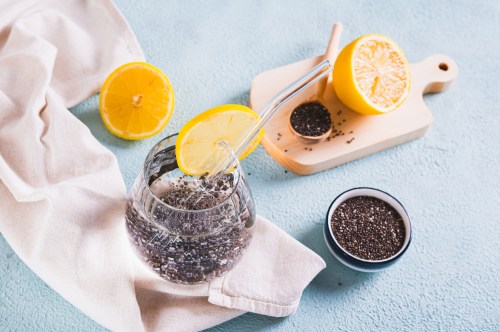Our editors independently select these products. Making a purchase through our links may earn Well+Good a commission
When I reach for my fork and chow down, rarely (um, never) do I consider which parts of my body I’m about to nourish. My tastebuds take the wheel and I barely acknowledge that all my organs—from my skin to my liver—are reacting to the macronutrients I’ve put on my plate. Lisa Mosconi, PhD, neuroscientist and author of Brain Food: The Surprising Science of Eating for Cognitive Power, argues that when it comes to eating well, the organ you use to think should be top priority.
“As a society, we are comfortable with the idea that we feed our bodies, and much less aware that we’re feeding our brains too,” she says. “Parts of the foods we eat will end up being the very fabric of our brains.” Brain-focused nourishment writ large has been on the rise in the wide world of wellness. Nutritional psychiatry has invited the foods we eat to be part of the larger conversation around mental health. And research, including Dr. Mosconi’s, reveals why: What we eat directly affects our cognition.
“Put simply: Everything in the brain that isn’t made by the brain itself is ‘imported’ from the food we eat.” —neuroscientist Lisa Mosconi, PhD
“To function best, the brain requires around 45 nutrients that are as distinct as the molecules, cells, and tissues they shape. The brain, being radically efficient, makes many of these nutrients itself, and only ‘accepts’ whatever else it needs from our diets. Put simply: Everything in the brain that isn’t made by the brain itself is ‘imported’ from the food we eat,” explains Dr. Mosconi.
The neuroscientist has dedicated her personal brain power to studying the blood-brain barrier, which determines which nutrients can—and cannot—make their way into the organ upstairs. “There are gates in the brain that open and close depending on whether the brain is ‘hungry.’ No other organs in the body have the same strict rules,” she tells Well+Good. Of all the foods she has researched, seven stand out as absolutely essential for optimizing brain health.
These are the brain foods a neuroscientist wants you to add to your diet
1. Fatty Fish
“I recommend cold water, fatty fish, especially Alaskan salmon, mackerel, blue fish, sardines, or anchovies,” says Dr. Mosconi. “These are all very high in the omega-3’s that your brain needs on a daily basis.” Adult women require about 1.1 grams of omega-3s per day, according to the National Institutes of Health. Three ounces of wild salmon contains about 1.24 grams of DHA and .35 grams of EPA (the two types of omega-3s found in seafood).
To give a little context here, the brain is about 60 percent fat. Studies show that DHA may help boost memory and cognition skills. And yet more research has suggested the anti-inflammatory properties of omega-3s could aid people with ADHD, too.
Fish oil is also a great source of omega-3s. Learn more about it from registered dietitian Tracy Lockwood Beckerman:
2. Dark leafy greens
If you’re not yet munching on nutritional leaves like kale, Swiss chard, and spinach, Dr. Mosconi says it’s time to go mainstream with your greens. “Dark leafy greens such as spinach, Swiss chard, dandelion greens, and kale are wonderful brain foods. These are all full of vitamins, minerals, fiber, and disease-fighting nutrients needed for a healthy nervous system,” says the expert.
These veggies are high in vitamin E, of which everyone needs about 15 milligrams per day. In early studies conducted on mice, the vitamin has been found to improve mitochondrial function and overall neurological performance. Half a cup of boiled spinach contains about 1.9 milligrams of vitamin E, or 10 percent of what you need in a day.
Like to drink your dark leafy greens? Find out if green juice is a healthy choice:
3. Extra virgin olive oil and flaxseed oil
Of all the cooking oils you can stock in your cabinet—and wow, there are a lot—Dr. Mosconi’s research finds that olive oil and flaxseed are the most prized by your brain. “These oils are loaded with anti-aging nutrients like omega-3’s and vitamin E. Extra-virgin olive oil is also rich in monounsaturated fat, a kind of fat that is good for the heartas well as for the brain,” she says.
4. Cacao
You read that right: chocolate (the right kind, that is) absolutely has a place in a diet for your brain. “Chocolate with a cacao content of 80 percent or higher—the higher, the better—is rich in theobromine, a powerful antioxidant known to support cellular aging and reduce the risk of heart disease and insulin resistance,” says Dr. Mosconi.
5. Complex carbohydrates
Despite the unstoppable rise of the keto diet, many nutrition experts still love complex carbohydrates. Dr. Mosconi is in the camp with all those telling you to go ahead and eat the dang (whole grain) bread. “These foods are naturally rich in glucose, which is the main energy source for the brain, but don’t impact our insulin levels,” she says. The very best sources are whole grains, beans, legumes, berries, and sweet potatoes.
Don’t worry, you can definitely get your complex carbohydrates from pasta:
6. Berries
“Berries are packed with antioxidants that help keep memory sharp as you age,” says Dr. Mosconi. “A great source of fiber and glucose, they are also sweet, but have a low glycemic index—so they help regulate blood sugar levels.” Summer is prime time for berries, so grab your blueberries, blackberries, mulberries, strawberries, et cetera. And if in case you were looking for another brain-boosting fruit that isn’t berries: pomegranate juice benefits are worth your attention.
7. Water
If you remember nothing else you read here, commit this to memory: Water consumption is incredibly important for brain health. “Of all the tricks I’ve learned for keeping my mind sharp, staying hydrated may be the one I follow most religiously, starting with a glass of water first thing in the morning—which is essential after a night without fluid intake—and ending the day with a cup of herbal tea,” says Dr. Mosconi.
Water is an essential building block for your brain, according to the neuroscientist. It fills the spaces between the cells, “helping to form proteins and to absorb nutrients, as well as eliminating waste products,” she explains. Even a 2 to 4 percent decrease in body mass due to dehydration throws the brain off balance, causing delayed reactions, headaches, mood swings, and more.
A functional medicine doctor has some thoughts on brain foods, too—including why you should make a “fat salad” for lunch.
—reviewed by Smita Holden, MD
Sign Up for Our Daily Newsletter
Get all the latest in wellness, trends, food, fitness, beauty, and more delivered right to your inbox.
Got it, you've been added to our email list.










